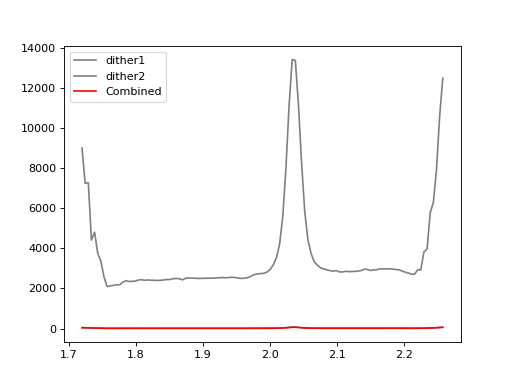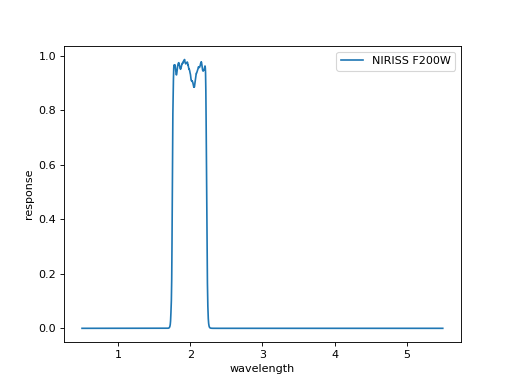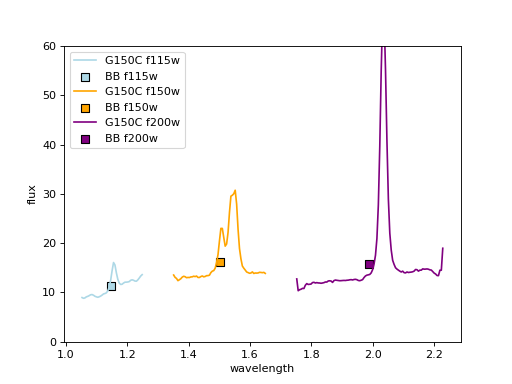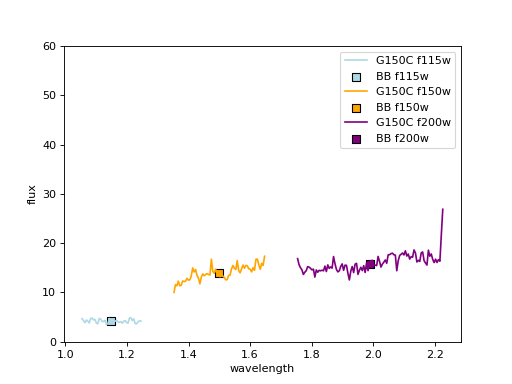WFSS Spectra Part 1: Combine and Normalize 1D Spectra#
Use case: optimal extraction of grism spectra; redshift measurement; emission-line maps. Simplified version of JDox Science Use Case # 33.
Data: JWST simulated NIRISS images from MIRAGE, run through the JWST calibration pipeline; galaxy cluster.
Tools: specutils, astropy, pandas, emcee, lmfit, corner, h5py.
Cross-intrument: NIRSpec
Documentation: This notebook is part of a STScI’s larger post-pipeline Data Analysis Tools Ecosystem.
Introduction#
This notebook is 2 of 4 in a set focusing on NIRISS WFSS data: 1. 1D optimal extraction since the JWST pipeline only provides a box extraction. Optimal extraction improves S/N of spectra for faint sources. 2. Combine and normalize 1D spectra. 3. Cross correlate galaxy with template to get redshift. 4. Spatially resolved emission line map.
This notebook will first combine optimally extracted 1D spectra (from #1) at different dither positions. The combined spectrum will then be normalized by flux estimated from direct images (i.e. broadband photometry).
This notebook will start with an optimally extracted 1D spectrum in the previous notebook, saved in a file with a name similar to “l3_nis_f115w_G150C_s00002_ndither0_1d_opt.fits”. The various one-dimensional spectra from each dither will be combined and saved into a single file, named like “l3_nis_f115w_G150C_s00004_combine_1d_opt.fits”.
Note: The procedure is not intended to combine spectra from the two different orientations (C&R), as each has a different spectral resolution depending on source morphology.
Note: Normalization of grism spectrum to each broadband filter photometry will improve zeropoint calibration, which is critical in continuum fitting over multiple filters.
%matplotlib inline
import os
import numpy as np
from scipy.integrate import simpson
from urllib.request import urlretrieve
import tarfile
from astropy.io import fits
import astropy.units as u
from astropy.io import ascii
import astropy
print('astropy', astropy.__version__)
astropy 7.2.0
import matplotlib.pyplot as plt
import matplotlib as mpl
# These gymnastics are needed to make the sizes of the figures
# be the same in both the inline and notebook versions
%config InlineBackend.print_figure_kwargs = {'bbox_inches': None}
mpl.rcParams['savefig.dpi'] = 80
mpl.rcParams['figure.dpi'] = 80
import specutils
from specutils import Spectrum
from astropy.nddata import StdDevUncertainty
print("Specutils: ", specutils.__version__)
Specutils: 2.2.0
0. Download notebook 01 products#
These can be also obtained by running the notebooks.
if not os.path.exists('./output'):
import zipfile
import urllib.request
boxlink = 'https://data.science.stsci.edu/redirect/JWST/jwst-data_analysis_tools/NIRISS_lensing_cluster/output.zip'
boxfile = './output.zip'
urllib.request.urlretrieve(boxlink, boxfile)
zf = zipfile.ZipFile(boxfile, 'r')
list_names = zf.namelist()
for item in list_names:
zf.extract(member=item) # Using extract instead of extractall because it is safer when files have absolute (/) or relative (..) paths
else:
print('Already exists')
Already exists
# Which data set?;
DIR_OUT = './output/'
filt = 'f200w'
grism = 'G150C'
id = '00004'
ndither = 2 # Number of dithering positions.
1.Combine spectra from different dithers;#
dithers = np.arange(0, ndither, 1)
for dither in dithers:
file_1d = f'{DIR_OUT}l3_nis_{filt}_{grism}_s{id}_ndither{dither}_1d_opt.fits'
fd = fits.open(file_1d)[1].data
if dither == 0:
wave = fd['wavelength']
flux = np.zeros((ndither, len(wave)), 'float')
flux_err = np.zeros((ndither, len(wave)), 'float')
flux[dither, :] = fd['flux']
flux_err[dither, :] = fd['uncertainty']
else:
wave_tmp = fd['wavelength']
flux_tmp = fd['flux']
flux_err_tmp = fd['uncertainty']
flux[dither, :] = np.interp(wave, wave_tmp, flux_tmp)
flux_err[dither, :] = np.sqrt(np.interp(wave, wave_tmp, flux_err_tmp[:]**2))
plt.plot(wave, flux[0, :], color='r', label='dither1')
plt.plot(wave, flux[1, :], color='b', label='dither2')
plt.legend(loc=2)
<matplotlib.legend.Legend at 0x7f27e2328c90>

Make weighted-average of the two spectra from different dither positions;#
flux_combine = np.zeros(len(wave), 'float')
flux_err_combine = np.zeros(len(wave), 'float')
for ii in range(len(wave)):
flux_combine[ii] = np.sum(flux[:, ii] * 1 / flux_err[:, ii]**2) / np.sum(1 / flux_err[:, ii]**2)
flux_err_combine[ii] = np.sqrt(np.sum(flux_err[:, ii]**2)) / len(flux_err[:, ii])
plt.plot(wave, flux[0, :], color='gray', label='dither1')
plt.plot(wave, flux[1, :], color='gray', label='dither2')
plt.plot(wave, flux_combine[:], color='r', label='Combined')
plt.legend(loc=2)
<matplotlib.legend.Legend at 0x7f27df8ac210>

2.Continuum normalization;#
Since NIRISS spectra may be affected background subtraction & contamination, which could lead to mismatch between filters, here we aim to normaliza spectra from filter to its broadband magnitude.
# Open broadband flux catalog from Notebook 01a;
# Flux are already in Fnu, with magzp = 25.0;
file = DIR_OUT + 'l3_nis_flux.cat'
fd_cat = ascii.read(file)
id_cat = fd_cat['id']
magzp = 25.0
fd_cat
| id | F309 | E309 | F310 | E310 | F311 | E311 | F308 | E308 | F1 | E1 | F4 | E4 | F6 | E6 | F202 | E202 | F203 | E203 | F204 | E204 | F205 | E205 |
|---|---|---|---|---|---|---|---|---|---|---|---|---|---|---|---|---|---|---|---|---|---|---|
| int64 | float64 | float64 | float64 | float64 | float64 | float64 | float64 | float64 | float64 | float64 | float64 | float64 | float64 | float64 | float64 | float64 | float64 | float64 | float64 | float64 | float64 | float64 |
| 1 | 4.17638 | 0.208819 | 13.9316 | 0.696578 | 15.8489 | 0.792447 | 2.39883 | 0.119942 | 0.29134 | 0.014567 | 1.45747 | 0.0728736 | 2.22433 | 0.111217 | 3.49623 | 0.174812 | 6.11505 | 0.305752 | 10.5682 | 0.528409 | 14.9279 | 0.746397 |
| 2 | 4.17638 | 0.208819 | 13.9316 | 0.696578 | 15.8489 | 0.792447 | 2.39883 | 0.119942 | 0.29134 | 0.014567 | 1.45747 | 0.0728736 | 2.22433 | 0.111217 | 3.49623 | 0.174812 | 6.11505 | 0.305752 | 10.5682 | 0.528409 | 14.9279 | 0.746397 |
| 3 | 4.17638 | 0.208819 | 13.9316 | 0.696578 | 15.8489 | 0.792447 | 2.39883 | 0.119942 | 0.29134 | 0.014567 | 1.45747 | 0.0728736 | 2.22433 | 0.111217 | 3.49623 | 0.174812 | 6.11505 | 0.305752 | 10.5682 | 0.528409 | 14.9279 | 0.746397 |
| 4 | 11.2928 | 0.564638 | 16.2032 | 0.810159 | 15.8489 | 0.792447 | 7.68422 | 0.384211 | 5.01649 | 0.250825 | 6.48634 | 0.324317 | 6.8612 | 0.34306 | 8.86339 | 0.44317 | 14.0217 | 0.701084 | 16.248 | 0.8124 | 16.2181 | 0.810905 |
| 5 | 7.23103 | 0.361551 | 6.29216 | 0.314608 | 6.30957 | 0.315479 | 5.6079 | 0.280395 | 0.175227 | 0.00876133 | 0.206633 | 0.0103317 | 2.71144 | 0.135572 | 7.08598 | 0.354299 | 6.86752 | 0.343376 | 6.46845 | 0.323422 | 6.36796 | 0.318398 |
| 6 | 7.23103 | 0.361551 | 6.29216 | 0.314608 | 6.30957 | 0.315479 | 5.6079 | 0.280395 | 0.175227 | 0.00876133 | 0.206633 | 0.0103317 | 2.71144 | 0.135572 | 7.08598 | 0.354299 | 6.86752 | 0.343376 | 6.46845 | 0.323422 | 6.36796 | 0.318398 |
| 7 | 7.23103 | 0.361551 | 6.29216 | 0.314608 | 6.30957 | 0.315479 | 5.6079 | 0.280395 | 0.175227 | 0.00876133 | 0.206633 | 0.0103317 | 2.71144 | 0.135572 | 7.08598 | 0.354299 | 6.86752 | 0.343376 | 6.46845 | 0.323422 | 6.36796 | 0.318398 |
# Retrieve filter curves for NIRISS images;
url = 'https://jwst-docs.stsci.edu/files/216454094/216454098/1/1762450948325/niriss_filter_tarball.tar'
filename = 'tmp.tar.gz'
urlretrieve(url, filename)
my_tar = tarfile.open(filename)
my_tar.extractall('./', filter='data') # add filter='data' to skip absolute (/) or relative (..) paths
# Load fiter response:
DIR_FIL = './niriss_filter_tarball/DATA/'
# The number corresponds to F200W in EAZY filter response;
eazy_filt = 311
# Read transmission data;
filt_data = ascii.read(f'{DIR_FIL}/NIRISS_{filt.upper()}.txt')
print(filt_data)
wave_filt = filt_data['Wavelength']
flux_filt = filt_data['FilterTrans']
plt.plot(wave_filt, flux_filt, ls='-', label=f'NIRISS {filt.upper()}')
plt.xlabel('wavelength')
plt.ylabel('response')
plt.legend(loc=1)
Wavelength FilterTrans PCE
---------- ----------- -----------
0.5 0.0 0.0
0.501 0.0 0.0
0.502 0.0 0.0
0.503 0.0 0.0
0.504 0.0 0.0
0.505 0.0 0.0
0.506 0.0 0.0
0.507 0.0 0.0
0.508 0.0 0.0
0.509 0.0 0.0
... ... ...
5.491 1.15901e-06 5.88441e-08
5.492 1.17562e-06 5.8551e-08
5.493 1.19224e-06 5.82397e-08
5.494 1.20426e-06 5.7781e-08
5.495 1.21578e-06 5.72767e-08
5.496 1.2271e-06 5.68508e-08
5.497 1.23762e-06 5.63651e-08
5.498 1.24814e-06 5.58675e-08
5.499 0.0 0.0
5.5 0.0 0.0
Length = 5001 rows
<matplotlib.legend.Legend at 0x7f27df87c110>

# Define a small function for flux convolution with filters;
def filconv(lfil, ffil, l0, f0, DIR='', c=3e18):
'''
lfil : Wave array for filter response curve.
ffil : Flux array for filter response curve.
l0 : Wave array for spectrum, in f_nu, not f_lam
f0 : Flux array for spectrum, in f_nu, not f_lam
'''
fhalf = np.max(ffil)/2.0
con = (ffil > fhalf)
lfwhml = np.min(lfil[con])
lfwhmr = np.max(lfil[con])
lcen = (lfwhmr + lfwhml)/2.
lamS, spec = l0, f0 # Two columns with wavelength and flux density
lamF, filt = lfil, ffil # Two columns with wavelength and response in the range [0,1]
filt_int = np.interp(lamS, lamF, filt) # Interpolate Filter to common(spectra) wavelength axis
if len(lamS) > 0:
I1 = simpson(spec / lamS**2 * c * filt_int * lamS, x=lamS) # Denominator for Fnu
I2 = simpson(filt_int/lamS, x=lamS) # Numerator
fnu = I1/I2/c # Average flux density
else:
I1 = 0
I2 = 0
fnu = 0
return lcen, fnu
# Convolve observed spectrum with the filter response.
# The input flux need to be in Fnu with magzp=25;
# Cut edge of observed flux;
con = (wave > 1.75) & (wave < 2.25)
lcen, fnu = filconv(wave_filt, flux_filt, wave[con], flux_combine[con], DIR='./')
print('Central wavelength and total flux are ;', lcen, fnu)
Central wavelength and total flux are ; 1.9885 15.889336490855992
# Get normalization factor;
iix = np.where(id_cat[:] == int(id))
Cnorm = fd_cat[f'F{eazy_filt}'][iix] / fnu
Cnorm
| 0.997455117721293 |
# Wirte the normalized spectrum:
# Make it into a Spectrum instance.
file_1d = f'{DIR_OUT}l3_nis_{filt}_{grism}_s{id}_ndither{dither}_1d_opt.fits'
obs = Spectrum(spectral_axis=wave*u.um,
flux=flux_combine * Cnorm * u.dimensionless_unscaled,
uncertainty=StdDevUncertainty(flux_err_combine * Cnorm), unit='')
obs.write(file_1d, format='tabular-fits', overwrite=True)
Repeat 1&2 for other filters too;#
DIR_FIL = './niriss_filter_tarball/DATA/'
filts = ['f115w', 'f150w', 'f200w']
# The number corresponds to NIRISS filters in EAZY filter response;
eazy_filts = [309, 310, 311]
# Masks for problematic flux at edge;
mask_lw = [1.05, 1.35, 1.75]
mask_uw = [1.25, 1.65, 2.23]
for ff, filt in enumerate(filts):
for dither in dithers:
file_1d = f'{DIR_OUT}l3_nis_{filt}_{grism}_s{id}_ndither{dither}_1d_opt.fits'
fd = fits.open(file_1d)[1].data
if dither == 0:
wave = fd['wavelength']
flux = np.zeros((ndither, len(wave)), 'float')
flux_err = np.zeros((ndither, len(wave)), 'float')
flux[dither, :] = fd['flux']
flux_err[dither, :] = fd['uncertainty']
else:
wave_tmp = fd['wavelength']
flux_tmp = fd['flux']
flux_err_tmp = fd['uncertainty']
flux[dither, :] = np.interp(wave, wave_tmp, flux_tmp)
flux_err[dither, :] = np.sqrt(np.interp(wave, wave_tmp, flux_err_tmp[:]**2))
# Combine;
flux_combine = np.zeros(len(wave), 'float')
flux_err_combine = np.zeros(len(wave), 'float')
for ii in range(len(wave)):
flux_combine[ii] = np.sum(flux[:, ii] * 1 / flux_err[:, ii]**2) / np.sum(1 / flux_err[:, ii]**2)
flux_err_combine[ii] = np.sqrt(np.sum(flux_err[:, ii]**2)) / len(flux_err[:, ii])
# Normalize;
filt_data = ascii.read(f'{DIR_FIL}/NIRISS_{filt.upper()}.txt')
wave_filt = filt_data['Wavelength']
flux_filt = filt_data['FilterTrans']
con = (wave > mask_lw[ff]) & (wave < mask_uw[ff])
lcen, fnu = filconv(wave_filt, flux_filt, wave[con], flux_combine[con])
iix = np.where(id_cat[:] == int(id))
Cnorm = fd_cat[f'F{eazy_filts[ff]}'][iix] / fnu
# Write:
file_1d = f'{DIR_OUT}l3_nis_{filt}_{grism}_s{id}_combine_1d_opt.fits'
obs = Spectrum(spectral_axis=wave*u.um,
flux=flux_combine * Cnorm * u.dimensionless_unscaled,
uncertainty=StdDevUncertainty(flux_err_combine * Cnorm), unit='')
obs.write(file_1d, format='tabular-fits', overwrite=True)
Results;#
The spectra are align with each other, as they are matched to BB photometry.
filts = ['f115w', 'f150w', 'f200w']
cols = ['lightblue', 'orange', 'purple']
for ff, filt in enumerate(filts):
file_1d = f'{DIR_OUT}l3_nis_{filt}_{grism}_s{id}_combine_1d_opt.fits'
fd = fits.open(file_1d)[1].data
wave = fd['wavelength']
flux = fd['flux']
flux_err = fd['uncertainty']
con = (wave > mask_lw[ff]) & (wave < mask_uw[ff])
plt.plot(wave[con], flux[con], ls='-', label=f'{grism} {filts[ff]}', color=cols[ff])
filt_data = ascii.read(f'{DIR_FIL}/NIRISS_{filt.upper()}.txt')
wave_filt = filt_data['Wavelength']
flux_filt = filt_data['FilterTrans']
con = (wave > mask_lw[ff]) & (wave < mask_uw[ff])
lcen, fnu = filconv(wave_filt, flux_filt, wave[con], flux[con])
iix = np.where(id_cat[:] == int(id))
plt.scatter(lcen, fd_cat[f'F{eazy_filts[ff]}'][iix], marker='s', s=50, edgecolor='k', color=cols[ff], label=f'BB {filts[ff]}')
plt.xlabel('wavelength')
plt.ylabel('flux')
plt.ylim(0, 60)
plt.legend(loc=0)
<matplotlib.legend.Legend at 0x7f27df764f50>

Repeat for another target;#
id = '00003'
filts = ['f115w', 'f150w', 'f200w']
eazy_filts = [309, 310, 311]
DIR_FIL = './niriss_filter_tarball/DATA/'
# Masks for problematic flux at edge;
mask_lw = [1.05, 1.35, 1.75]
mask_uw = [1.25, 1.65, 2.23]
for ff, filt in enumerate(filts):
for dither in dithers:
file_1d = f'{DIR_OUT}l3_nis_{filt}_{grism}_s{id}_ndither{dither}_1d_opt.fits'
fd = fits.open(file_1d)[1].data
if dither == 0:
wave = fd['wavelength']
flux = np.zeros((ndither, len(wave)), 'float')
flux_err = np.zeros((ndither, len(wave)), 'float')
flux[dither, :] = fd['flux']
flux_err[dither, :] = fd['uncertainty']
else:
wave_tmp = fd['wavelength']
flux_tmp = fd['flux']
flux_err_tmp = fd['uncertainty']
flux[dither, :] = np.interp(wave, wave_tmp, flux_tmp)
flux_err[dither, :] = np.sqrt(np.interp(wave, wave_tmp, flux_err_tmp[:]**2))
# Combine;
flux_combine = np.zeros(len(wave), 'float')
flux_err_combine = np.zeros(len(wave), 'float')
for ii in range(len(wave)):
flux_combine[ii] = np.sum(flux[:, ii] * 1 / flux_err[:, ii]**2) / np.sum(1 / flux_err[:, ii]**2)
flux_err_combine[ii] = np.sqrt(np.sum(flux_err[:, ii]**2)) / len(flux_err[:, ii])
# Normalize;
filt_data = ascii.read(f'{DIR_FIL}/NIRISS_{filt.upper()}.txt')
wave_filt = filt_data['Wavelength']
flux_filt = filt_data['FilterTrans']
con = (wave > mask_lw[ff]) & (wave < mask_uw[ff])
lcen, fnu = filconv(wave_filt, flux_filt, wave[con], flux_combine[con])
iix = np.where(id_cat[:] == int(id))
Cnorm = fd_cat[f'F{eazy_filts[ff]}'][iix] / fnu
# Write:
file_1d = f'{DIR_OUT}l3_nis_{filt}_{grism}_s{id}_combine_1d_opt.fits'
obs = Spectrum(spectral_axis=wave*u.um,
flux=flux_combine * Cnorm * u.dimensionless_unscaled,
uncertainty=StdDevUncertainty(flux_err_combine * Cnorm), unit='')
obs.write(file_1d, format='tabular-fits', overwrite=True)
filts = ['f115w', 'f150w', 'f200w']
cols = ['lightblue', 'orange', 'purple']
for ff, filt in enumerate(filts):
file_1d = f'{DIR_OUT}l3_nis_{filt}_{grism}_s{id}_combine_1d_opt.fits'
fd = fits.open(file_1d)[1].data
wave = fd['wavelength']
flux = fd['flux']
flux_err = fd['uncertainty']
con = (wave > mask_lw[ff]) & (wave < mask_uw[ff])
plt.plot(wave[con], flux[con], ls='-', label=f'{grism} {filts[ff]}', color=cols[ff])
filt_data = ascii.read(f'{DIR_FIL}/NIRISS_{filt.upper()}.txt')
wave_filt = filt_data['Wavelength']
flux_filt = filt_data['FilterTrans']
con = (wave > mask_lw[ff]) & (wave < mask_uw[ff])
lcen, fnu = filconv(wave_filt, flux_filt, wave[con], flux[con])
iix = np.where(id_cat[:] == int(id))
plt.scatter(lcen, fd_cat[f'F{eazy_filts[ff]}'][iix], marker='s', s=50, edgecolor='k', color=cols[ff], label=f'BB {filts[ff]}')
plt.xlabel('wavelength')
plt.ylabel('flux')
plt.ylim(0, 60)
plt.legend(loc=0)
<matplotlib.legend.Legend at 0x7f27df61ca90>

